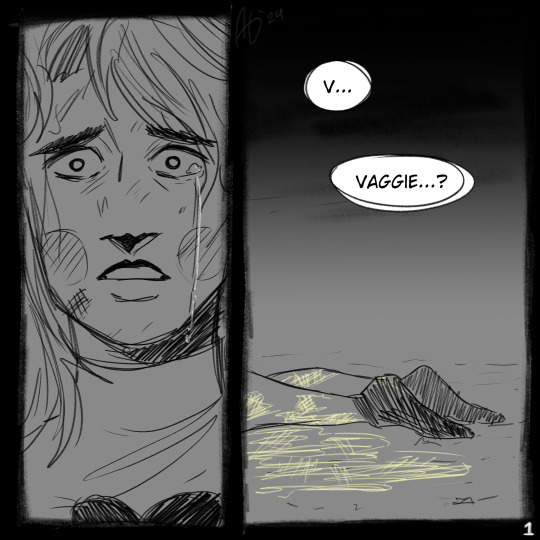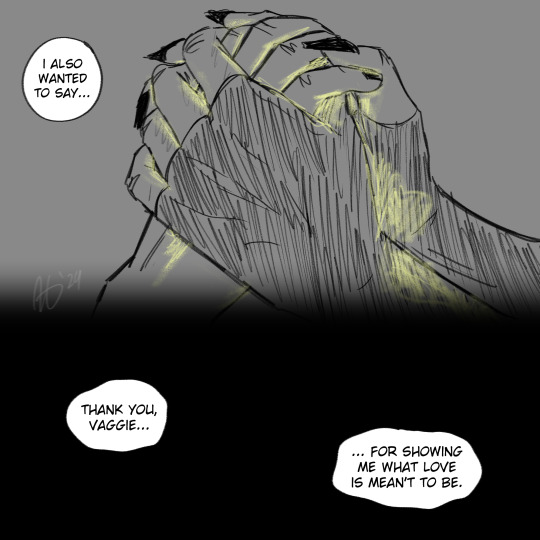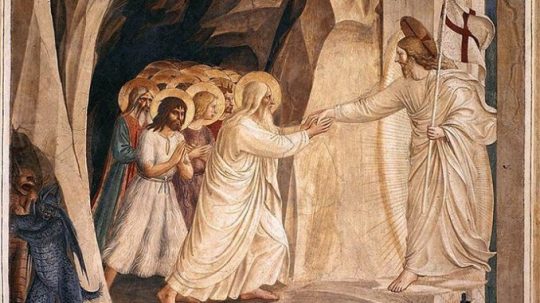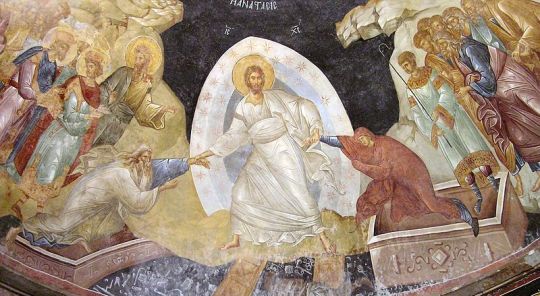Text
It also requires a shit ton of critical thinking and literary analysis skills. And a good chunk of knowledge of various cultures symbolism parallels, folklore.
Like it's a solid read even if you don't know all of that. But if you do.... it's a rabbit hole you don't want to get out of. For me, it makes the experience 1000 times better. This series are *chef's kiss*
I don't say this as an insult to YA fiction because there are some amazing works in that genre, but The Locked Tomb is absolutely not YA fiction. It's almost an advanced science textbook
#its an incredible read.#it brings out the literary academic in me#And i havent done anything literature related since high school#I have enjoyed this series more than words can describe.#and like the sumbolism#the themes#Love in all its aspects#and not the diabetes inducing surface level romance thats been going around in media#Noooo its the I d kill for you and die for you and merge out souls together without ever saying that its love#Cause yes it's an emotion complicated af#and the books represent it as complicated af#And I AM HERE FOR IT
198 notes
·
View notes
Text







earthly attachments 🌊🪨🔥🌬️
due to popular demand i added kavik!!
(edit: omg tumblr RUINED the quality so i added the solo portraits 😭)
491 notes
·
View notes
Text






i am begging you all to stop treating this site like instagram if you dont want it to be content free by next year
#someone had to come out and say it#honestly#Like I made the same mistake when I first came in on Tumblr#But dudes its not how it works#thank you op
156K notes
·
View notes
Text
Someone said "Are you really so stupid to think that Africa has the same technological advances as us? If they did they would probably have clean water and not live in houses made of sticks and mud. Get over yourself and stop being so ignorant."..... Below is a tiny collection of images of the Africa they refuse to show you..




ches






I’m sorry you’ve been made to believe that the whole of Africa is poor, I really am..
784K notes
·
View notes
Text
The Night Circus Impressions #1
So, I started reading the Night Circus today, (and I can feel that half-written paper for my ICU class glaring at me, but who cares). And I am intrigued.
SPOILERS FROM HERE AN ON in case someone else also lived under a rock and only now is reading the book.
Granted I am a measly 28 pages in, but I already have quite a few opinions, and I am trying to keep my brain from diving too far in character analysis so soon. But so far I rly like the contrast between Prospero/ Hector and "Alexander".
The initial impression, albeit only for a few lines as they meet for the first time would have you believe that perhaps Hector is kind of the better option of the two, for a mentor. But that's how he is initially presented to us. He is presented as rly charismatic, and magnetizing and well, he is a performer. Alexander on the other hand comes off as stand offish and entirely too critical, and perhaps a bit cold.
As the narration continues though, we see that Hector has this... obsessive almost interest in his daughter's abilities and to the external observer he seems to look for ways to exploit them, even as he "trains" her. I cannot find the exact word for it, but he treats it like a business opportunity. He sees her abilities, her "Talent" and not her. And he only seems to care for it too. He is eccentric and awfully insistent in participating in that so called game, and from what I have seen so far in the narration he is petty and cruel even at times. He is wholly uninterested in what she likes and all but fights her for it -although at a later point he seems to have stopped antagonizing her interest for books so much, and he uses her like a circus attraction of sorts with her readings. I rly want to see where this goes as the book progresses
Then we have the man in the grey suit. Stand offish though he is, he seems to take greater care of his mentee than Hector. And a completely different approach to their capabilities. We see runes and symbols, we see him disapproving of Hectors theatrics. He is presented as more steadfast and methodical, and when he imparts something to Marco it feels more direct and clear, even to the reader. He also seems to be an absent enough, but somewhat caring figure, if only for the purposes of the game and Marco's training. He is no less aloof and secretive than Hector, but so far, through the boy's eyes he seems to be doing a far better job at preparing him for the game.
Reading abt those two feels like watching an argument about whether innate ability or talent is better than practicing or training.
Anyhow, I am going back to that paper.. ugh, More thoughts when I progress a bit with the plot.
See y' all later
#the night circus#Hector Bowen#Alexander the night circus#celia bowen#marco alisdair#character analysis#somehow#I am like 30 pages in so...#I'll get back to you soon
2 notes
·
View notes
Text
Ugh, was having a great time mocking my recently imprisoned rival when I noticed the camera positioning makes it so that I appear behind the bars, thus framing me as trapped in a metaphorical prison of the narrative, now my whole day is ruined. Fuck.
103K notes
·
View notes
Text
Poe’s Annabel Lee in TLT #2
You thought I'd never post it huh? Well about a month later, here is the beast. Enjoy!
We have already delved into the most obvious parallel that the TLT books create, between John and Alecto and the heroes of Poe’s Annabel Lee. I would like to now draw some comparisons between Gideon and Harrow and Annabel Lee. This might seem a bit far-fetched, because how can John and Alecto AND Gideon and Harrow exist in the same premise within Poe’s lines?
The answer is simple. They don’t. Contradictory, I know, but a lot of that comparison and many of those parallels stem from the fact that those two pairings themselves are reflections of one another. Or perhaps picture negatives. After all, what John and Alecto had, stems from love, and it is plainly stated – as plainly as all things in Muir’s writing are, at least – whereas the beginning of Gideon and Harrow’s relationship sprouts from unadulterated loathing. We learn afterward of course that this is not really the case, what with Gideon sacrificing herself in an act she perceived as the only act of Love, she could offer to Harrow and whatnot. But the parallels are there. And it is deliberate, for John and Alecto broke the world, and Gideon and Harrow will remake it – or die trying. Muir has a wonderful way of interweaving elements in the plot and creating comparisons, parallels, and antitheses between the countless colorful dynamics in the books. So, I feel where John and Alecto broke the world, and are going to -probably – die, Gideon and Harrow will step up and mirror them, bringing hope back to the world. As @local-selkie said, the series probably won’t end without hope. Hope for reconciliation, for fixing what has been irrevocably broken, hope for breaking circles and hope for a better tomorrow. (Yeah well, I may be a cynic, but I am human above all, and if there is one thing that humans yearn for, live for and fight for, it’s hope. Naïve, childish, hope. It’s what makes us better, I think)
Onto drawing a few parallels now,
It was many and many a year ago
In a kingdom by the sea
That a maiden there lived whom you may know
by the name of Annabel Lee
Not really much to say about this one. Our story for these two starts about twenty years ago, in far off Pluto – well, the Ninth – with the salty ass underground (might point to there having been saltwater there at some point) where Wake collapsed dead, and a wailing Gideon was found. Harrow had not yet been born, and frankly neither of them would be what one would call a fair maiden.
And this maiden she lived with no other thought
than to love and be loved by me
I was a child and she was a child
In this Kingdom by the Sea
Here I feel we could consider this a reference to the shared childhoods of our heroines. The lonely, shared childhood of our heroines. For there were no other children on the Ninth, and they bitterly clung to each other with all they had. Even if it means beating each other into a pulp within an inch of their lives. Because Harrow was a child, and Gideon was a child on the far off Ninth, where there were no other children, and all they had was each other and their rivalry. So, I can see the whole “she lived with no other thought” than finding a way to make each other’s life hell. And as we see going forward in the books, that was all they could do to love each other, the only way they knew how.
But we loved with a love that was more than love—
I and my Annabel Lee;
With a love that the winged seraphs of heaven
Coveted her and me.
We loved with a love that was more than love, we loved with a love that felt like hatred, with a devotion that felt like abandonment, because Gideon could think of no greater act of love than sacrificing herself for Harrow, than letting Harrow consume her, and Harrow could think of no fate worse than that. Harrow loved Gideon so much the greatest act of service, of devotion, of love she could think to offer to her ill-matched cavalier was to spare her, to let her live. And they both failed spectacularly at that, but oh well. Angst.
As for the analogue to the seraphs, this is a bit trickier than John and Alecto. Because for them it’s obvious it’s the rest of the Lyctors, the Lyctors that couldn’t compete with John’s monster cavalier, the Lyctors that could never achieve their perfect connection. But who could it be that covets the connection between Harrow and Gideon? I think to be able to imagine an answer to that we should take a step away from the narrative and look at them from everyone else’s perspective. For the Niners it’s a no brainer. They know Gideon, they know Harrow, they would never think of a worthy connection between the two as highlighted by Crux’s words in NtN (and goodness if that didn’t hurt). But what about the Canaan House? Contrary to Harrow’s insecurities and paranoia, to the external observer they do present a united front. The two black clad nuns of the Ninth, with their veils and their disconcerting face paint, with their creepy/ damning/ borderline heretical prayer, the tiny unhinged necro, and the huge, silent Cav that disarmed Magnus in three moves, that seem so in sync it’s almost uncanny (“Death first to vultures and scavengers - AN ICON). So, I could see, the rest of the people in Canaan House at least envying their connection a bit, (if they haven’t already figured them out – like Pal and Ianthe), at least at first glance. And then there is ofc SYLAS OCTAKISERON, (I hate him, I am sorry, but if I could stick him headfirst to the ground I would). The Eighth generally isn’t that fond of the Ninth so no surprise there. I am rly not sure how the OG Lyctors would feel abt them but if you have any ideas feel free to share.
And this was the reason that, long ago,
In this kingdom by the sea,
A wind blew out of a cloud, chilling
My beautiful Annabel Lee;
So that her highborn kinsman came
And bore her away from me,
To shut her up in a sepulchre
In this kingdom by the sea.
The angels, not half so happy in heaven,
Went envying her and me—
Yes!—that was the reason (as all men know, In this kingdom by the sea)
That the wind came out of the cloud by night,
Chilling and killing my Annabel Lee.
Alright, so as I mentioned before, this is where the tone shifts to something more chilly, if you will. No more fairytale notions – as much as Gideon and Harrow can be perceived as a fairytale. But if we want to be particular abt Gideon and Harrow’s timeline this is the exact point where Harrow makes herself a mausoleum for one more soul, Gideon. (The pain though). I know that at first, I interpreted kingdom by the sea as the Ninth, for Gideon and Harrow, but here I think it is safe to assume that it is referencing earth again, aka the First, where the final showdown for GtN is taking place. The highborn kingsman, I think again references the Lyctors only this time we are talking Cytherea, that forced Gideon’s hand, in sacrificing herself and Harrow partly consuming her. And now Gideon is a part of Harrow, locked away in her - soon to be lobotomized - temporal lobe.
And obviously Harrow aches for Gideon, for she never wanted this to be her fate. She consumed her out of necessity, not out of want. It is the process of Lyctorhood itself that comes and takes Gideon from Harrow, that causes this painful sacrifice, and has her clutching at whatever remnants of Gideon she has, as hard as possibly, with no plan whatsoever, but to preserve her, thus rendering Gideon’s sacrifice pointless.
But our love it was stronger by far than the love
Of those who were older than we—
Of many far wiser than we—
And neither the angels in heaven above,
Nor the demons down under the sea,
Can ever dissever my soul from the soul
Of the beautiful Annabel Lee:
And this is Lyctorhood ala Harrow. Aka rendering the whole procedure useless, because you love your cavalier so much you cannot bear the thought of killing and consuming them. (Or well, Lyctorhood ala Ninth House, because Anastasia attempted preserving Samael first. I mean we can see that the Ninth Necros love their cavs too much – They literally both went, Immortality and immense power? No, thanks, I don’t want it without my cav by my side. They’re both ambitious enough to try, however, and we saw what that cost them). I think that this part works as a foreshadow for Gideon and Harrow in the future, (for a hopeful future) as well as it is the part with the closest parallel to Alecto and John. Because part of Alecto is in Harrow and part of Gideon is John, and their love is enough that Gideon kills herself for Harrow, no regrets, and the stubborn, little, malnourished nunlet lobotomizes herself to spare Gideon being consumed into nothingness. So yes, their love transcended that of the other Lyctors and their cavs, because they refused to make the sacrifice, because they loved each other so much they found a way to at least stop the procedure, instead of just ling down and taking it (well Harrow did, Gideon was ready to die for her. And again. How Gideon thinks so little of herself she thinks she is better off as a sacrificial lamb, and Harrow in her endless guilt just refuses to let her – masterful and painful in equal measure. They both feel betrayed, because the other didn’t let them die, but wanted them to live.
As for the never severing the souls, I have two words for you. Perfect Lyctorhood. (Just an idea, but we’ll see)
For the moon never beams, without bringing me dreams
Of the beautiful Annabel Lee;
And the stars never rise, but I feel the bright eyes
Of the beautiful Annabel Lee;
And so, all the night-tide, I lie down by the side
Of my darling—my darling—my life and my bride,
In her sepulchre there by the sea,
In her tomb by the sounding sea.
Dreams of the beautiful Annabel Lee, like the coffee-shop au dream/hallucination Harrow has? Like the constant nightmares where her brain glitches replacing Gideon with Ortus?
I must admit that this part to me also highlights the connection between Harrow – Anastasia’s Line – and Alecto. Because we meet Alecto through the dreams, because Harrow sees Alecto in her sleeping and wakeful hours, because in the dream Harrow is Alecto and Alecto is Harrow.
The bright eyes of the beautiful Annabel Lee, Alecto’s golden eyes, Gideon’s golden eyes, and Harrow’s own dark ones, that while not bottomless pits are pretty dark in their own measure. Now the lying down next to my beautiful Anabel Lee part, is… tricky for those two. I honestly don’t have many ideas abt it. I can picture it as Kiriona and Harrow sitting next to one another in the Tomb, and together undoing what has been done, and then having their happy ending, but that’s as far as it goes. If we take the idea that Harrow is the mausoleum in which Gideon’s soul is preserved, I can imagine that the whole thing will happen in the River. Perhaps from an access point on the Ninth, but literally this part is the one I most struggle to interpret.
Of course, we also need to take the biblical connections into account, and those biblical connections are in large why there are so many parallels between the two pairings. You have God and his offspring, that sacrifices herself, you have Harrow, who in a sense is also Christ going down in Hades in the days before the resurrection, and you have Alecto. John is Gideon and Harrow is Alecto and it’s a glorious mess. We have parallels in a love that transcends all that was known before, we have it starting from what is perceived as hate but in reality, is the last strings of their sanity sticking together, with a few sprinkles of codependence. And again, is that love truly as beautiful as it appears?
We do tend to romanticize it a lot in the fandom, but ultimately, it’s a story about grief and loss. Harrow’s story is abt grief and loss and guilt. The future of the ninth was sacrificed for her to be born, her whole planet will be lost if she doesn’t find some way to help it, she has already lost so much and sacrificed so much to be where she is, and the last straw is Gideon’s death and coming back as Kiriona. And Gideon, Gideon that was born alone on the ninth that no one wanted, no one paid attention to but Harrow – Harrow who made her life a living hell yes, but Harrow who talked to her, even if it was just to exchange insults. Gideon abandoned by the world, that loved Harrow and harrow abandoned her too, in choosing not to utilize her sacrifice. Their stories are so interwoven with themes of love, loss, and grief, that the parallels are hard not to draw.
Anyhow, I am beat. I hope this makes sense. Feel free to add your own thoughts and comments, and don’t forget to take care of yourselves.
Till next time!
PS check out @katakaluptastrophy's post abt the descent of Christ/Harrow in Hades here.
It's spectacular, as usual (The articulation is so on point I cannot. I feel like a mad scientist reading a scholar's work every time). And perhaps with the Orthodox Easter approaching I might take the chance to revisit the scriptures myself.
And @fkapommel's post abt the duality of the Christ symbolism in Gideon and Harrow here.
I enjoyed this too much not to recommend it.
#the locked tomb#tlt#tlt series#tlt spoilers#john gaius#harrowhark nonagesimus#alecto the first#alecto tlt#harrow the ninth#alecto the ninth#gideon the ninth#gideon nav#harrowhark#alecto#nona the ninth spoilers#nona the ninth#tlt meta#tlt fandom#gideon the 9th#kiriona gaia#Annabel lee#poetry#literary parallels#literary analysis#tlt fan theory#Alecto and John mirror Harrow and Gideon#Or the opposite#They are each part of the other#One for damnation and one for salvation
36 notes
·
View notes
Text


griddleharlectostasia brainrot hours
#My fucking heart#the mirroring#I CANNOT#the dynamic between alecto and anastasia is sooo interesting#I can write pages for those two#and my goodness the color scheme#the reflection#the detail#GREAT JOB OP#i am loving it#gideon the ninth#the locked tomb#griddlehark#alectostasia#incredible
5K notes
·
View notes
Text
"Thank you for everything."







#hazbin hotel#chaggie#rainbowmoth#hazbin hotel charlie#hazbin hotel vaggie#who gave you the right#My heart#it huuuurts
619 notes
·
View notes
Text
Heaven is not entirely on the wrong – a hazbin hotel theory #3 SERA
I know, you hate her. The Seraphim that is all high and mighty, and has ordered the slaughter of countless souls. (I am not going to say innocent or not, but they were souls).
But let us try to see things from her perspective for a bit. She is responsible for all the souls up in heaven, and has a little sister, mentee, daughter idk, that she cares about very much. Perhaps even too much, in the sense that to me she comes off as so overprotective she didn’t; tell Emily what she needed to know. She tried to protect her innocence and paid for her decision of keeping Emily in he dark with losing Emily’s trust. It’s a barrier that overprotective guardians often cross with their charges. They make the decisions for them, keep them in the dark, because they think they know better, and don’t really acknowledge that said charge (child, sister etc) has grown up, is their own person, can make their own decisions and form their own opinions.
Back to the point, you have an overprotective Sera responsible for the countless souls up in heaven, the hell in turmoil with a supposed uprising, lead by Lilith? (We don’t really know much abt her to be sure) that could threaten the order you are trying to maintain.
And let us not kid ourselves, heaven loves order. And rules. It’s a really hierarchical and disciplined society, but it is fallible to failings because of that. Because rules don’t predict everything, laws are not always right. Moral and lawful are not always on the same page. Heaven in Hazbin is meant to enunciate the failings of such a system that religiously follows rules, unbendingly and relentlessly. It’s a bit like how morally correct and lawfully correct do not overlap, and people who are applauded for the morality of their decisions might find themselves facing legal repercussions. (And it’s why I’d make a terrible lawyer, sorry mom).
So she has to do something. She needs to protect order and all that’s good. She is desperate. And then comes in with the “masterplan”, that serves his own sadism and entertainment but ultimately makes him and unwitting hero. And “you have to listen it was such a hard decision” and I believe that. It’s also a decision that she made in tandem with Adam and Lucifer. But it burdens on her so much because genocide goes against what she stands for.
And I’d like to take the hellfire that’s reflected in her eyes in the song and give it another spin. One that is unlikely, but still. I’d like to propose that the fire, reflects exactly that inner turmoil, that fire of consequences that burns within Sera herself, reflects the hellishness of her decision and that it makes her less than holy. Not necessarily that she is bad and has an agenda against hell, but she made a hellish decision that redacts from her holiness, and that is reflected in the hellfire that burnt in her eyes on that moment.
Ofc that doesn’t make the decision correct or a moral one. And we do see her struggle with it. It’s also a burden she is unwilling to share with anyone. “I though since I m older, that its my load to shoulder.” She is not happy abt that decision, that load that burdens her, but she doesn’t want Emily to bear that same burden, that probably eats away at her bit by bit. Which could be why she is so disgruntled when Pentious arrives. Because she has burdened herself, doused her hands in sin and the blood of countless souls, only to learn that it’s redundant. She made a sacrifice only to learn that it was not needed. And ofc her initial sentiments abt it won’t be positive.
Because it gives you solace, thinking that the decision is necessary. It calms your conscience thinking, I couldn’t do anything else. It’s probably what had her sanity hanging by a thread as far as the exterminations go. And then she learns that, she didn’t have to do it. There was no reason for restless sleepless nights, for breaking heavens rules, for going against what she believed in. She sinned when she didn’t have to. And it’s not sth anyone would have positive feelings about at least initially.
I don’t think the show will go that way, because so much it has been anti heaven, and well Sera’s portrayal does allude to sth more sinister going on behind the scenes. And Sera could be in on that, vengeful and anti-hell or she could be merely a pawn in a larger scheme.
Sera is also ancient. And has witnessed many of the marvels that humanity has achieved. Both the good and terrible ones. And well, you cannot teach an old dog new tricks. She has formed her opinions already, and there are little chances she’ll change her mind. That’s a big issue with immortal characters, that needs to be leaned into correctly, to make their immortality and all that experience play as either a vice or a virtue. So, she is ofc going to be skeptical abt redemption. Perhaps she has seen other attempts before, perhaps she has seen schemes parading around as redemption that only aimed in disorder and chaos.
And something that annoys me a bit abt various character portrayals, is how they get positively or negatively seen regardless of the actual weight of their decisions. Adam is a fan favorite, and he is a prick. Carmilla was willing to let all of hell burn to save just her daughters. (I love her soooo much though. And she did help in the end.) It’s a bit of a case that the hero would sacrifice you to save the world, and the villain would let the world burn if it meant it would keep you safe.
And Sera sacrifices souls that have already been condemned by divine judgement – again I think that the worthy ones if there had been any, probably popped up in heaven’s doors with amnesia or sth and thus the whole thing went under their noses – to save those that she is charged to protect. It burdens her, but she does it all the same. Protecting countless people that in her eyes, have already proved their worthiness of being saved.
Again this introduces the faults and struggles with power, oppression discipline and rules, and how they can limit one’s view of the truth. Heaven is the one presented with the struggles of corrupt power, more so than hell in hazbin, because it’s more subtle. It’s the day to day struggle with laws and rules that give enough leeway to Adam to be an asshole and be up there but condemn Vaggie for sparing a hell born child.
All in all yes we are talking about flawed characters. Nuanced and with their own struggles, but that needed to be considered in another light as well. This was a really fun exercise to try and distance these characters from the lighting that the show already paints them with and give them a bit of a spin from an outsiders perspective. Ofc this doesn’t erase their flaws but we need to see them as the multidimensional characters that they are, and all the different levels of struggle they deal with. It’s not all black and white after all.
#Hazbin Hotel#hazbin hotel fandom#hazbin hotel theory#hazbin spoilers#sera hazbin hotel#sera seraphim#seraphim emily#emily#emily the seraphim#hazbin hotel text post#Sera might not be as bad is she is being portrayed#extermination hazbin hotel
13 notes
·
View notes
Text
Heaven is not entirely on the wrong – a hazbin hotel theory #2 – Exterminations
Something that is often overlooked or sugarcoated a bit in Hazbin amidst all the goofy songs and trust exercises, is that Hell is terrible. There I said it. Hell is a blood terrible place to be. It’s a place of eternal torment, and a prison, a container if you will, for the most terrible of people that have walked on earth. (Let’s not forget that fan favorite Alastor was a psychotic serial killer when he was alive, and still is a master puppeteer, a manipulative, powerful owner of countless souls that is undoubtedly cruel.)
Murder. Manipulation. Abuse. R*pe. They all exist in abundance down there. And for the average sinner down in the pride ring, things are tough. After being exposed to all that and worse even – as we glimpse with Angel, and Husk – your average sinner is left severely traumatized, if not also physically hurt (regenerative abilities, so idk). To put it simply, hell is a hellish place. And even our beloved princess of Optimism in all her naivete sees it and wants to help. Thus, the plan for rehabilitation and getting a postmortem chance at redemption. (Though how many of them can be redeemed? And does it count if they only do it in fear of punishment? What about metanoia? Is it sincere? What if someone breaks through that shouldn’t have?)
Hell is overpopulated and here comes heaven with its plan of annual exterminations to keep the population on the down low. And Adam who does it purely for his own entertainment. And Sera who internally struggles with having given the okay for them. (We’ll get to her in a bit, though).
Here comes the controversial part. If Hell is such a terrible place to be, and no one wants to be there, isn’t killing sinners a way of freeing them from their torment? (It sounds bad I know, and I don’t intend to turn this to an assisted – suicide / euthanasia debate). And if they are “worthy” see rehabilitated, aka have regretted what they’ve done, aka can be redeemed their souls are cleansed and free to ascend to heaven.
We are not talking about exterminators, we are talking abt exorcists. And if you are familiar with at least horror movies – not necessarily history or religion – you know that exorcists vanquish restless or misguided souls and release them. It’s not a form of punishment, but historically an attempt to help the soul rest in peace. So, if the name choice is deliberate and we are talking exorcists and not exterminators, aka soul cleanses instead of forever death, things might not be as bad.
Keep in mind that I am saying this from an outsider’s perspective and the show is portrayed from the sinner’s perspective. Or at least the denizens of hell. The very traumatized denizens of hell that amongst all their other torment have to be worried abt being killed like cattle once a year. And they have no idea what happens once you die by angelic spear. So that births fear and paranoia Not to mention that Adam and Lute’s sadism and the general bloodthirsty tendencies of the exorcists don’t help the case.
The narrative perspective is meant to make us empathize with the sinners and the denizens of hell, not heaven not the angels, and certainly not Adam or Sera. In the shows narrative they are supposed to represent the corrupt order and oppressive powers we are supposed to resent, whether that is objectively the case, is an entirely different discussion. So the perspective, and the narrative tools used express that particular POV, and the plot and characterization is meant to support that. Consequently, the questions abt narrator reliability arise, and what I have said above seems lackluster and completely opposite to what the show tells us.
Another point I wanted to bring up is that the way Charlie pitches the idea of the hotel, and a chance at redemption has a bit of a… big hole in it. Anyone can improve at any time yes. I agree. But people that are in hell, have already had the chance to improve for so long as they were alive. It is an arduous process, a mountain to climb yes, but if one truly desires to redeem themselves for what they have done, and become a better person they would have tried before. Perhaps tried and failed, but tried, nonetheless. Which sets those people up perfectly to be residents of the hotel. But how many of them are there? How many ended up in hell? How many of those in hell actually want to redeem themselves, regret, change their ways and ask for forgiveness? So, the postmortem redemption is kinda fishy. And there is another reason for it as well. If you want to redeem yourself, just for the shake of avoiding punishment, and eternal suffering, is it really redemption? Do you really want to become a better person? Or just avoid the consequences of your decisions in life?
And as we see none of the people in hell, apart from Vaggie, believe in Charlie’s plan. Most even ridicule her for it. Including Angel who just wants free food and a place to crash at night. And who while having showin signs of improvement, still is in hell. Would just sticking to Adam’s rules, make him go up in heaven? Would that balance out all that he has done in life? Hell, does Sir Pentious’ sacrifice balance out all he did in life? And earns him a place in heaven?
Alright though, Sir Pentious is a mostly harmless goofball. What about people Like Vox and Alastor, Valentine, Velvette, the overlords? Hell is populated and in part ruled by the worst that humanity has to offer. And what happens if one of them manages to break the system, manipulate Charlie, fool her and take advantage of her, and end up in heaven? What will that spell for all the innocent souls up there?
Could infiltration be the key to a new Hellish uprising? And war between heaven and hell? Would corruption sheep into all their hearts? Idk what would happen but it would spell disaster for all the innocent souls in heaven that remain ignorant of all that mess.
And lastly a big elephant in the room I’d like t o address. Is Pentious really the first denizen of hell to be redeemed? He gets blasted by holy light and ends up in heaven, because he dies in an act of self-sacrifice. Have there not been any sinners before him that just tried to get by in hell? That ended up there for a stupid reason, or sth that they didn’t quite have a choice about, and then tried to make the most of their life in that mess, regretting what they have done? And if so, if they were killed in exterminations, why would they not ascend to heaven instead of being cast away to oblivion? Like Sir Pentious?
What if there were souls that were worthy of heaven, and with their release – however violent – from the plane of hell they had the chance to ascend? If it is possible now, wouldn’t it have been possible before? Why would Pentious be the only one? Or the first one for that matter?
In all the history of hell, I m supposed to believe that the only time a soul was regretful and changed and could have been redeemed was Pentious, with that one act of self-sacrifice? No woman that might have killed her abuser, and regretted taking a life but never regretted gaining her freedom, no man stranded in a desert or struck by a great famine with nothing to eat, hunt or scavenge but the bodies of his dead comrades? People that genuinely were faced with an impossible choice and ended up in hell for making it.
In a way I feel that if redemption is possible now, it was also possible before. It just flew under the radar, because probably no one ended up face to face with Sera after their ascend. Otherwise, she would have known it’s possible. And perhaps taken other measures.
And yes my ridiculous last argument leads me to the third installment of this huge mess
#3 – SERA
#hazbin hotel theory#hazbin hotel#hazbin hotel exterminators#hazbin hotel exorcists#adam#lute#Extermination Hazbin hotel#Analysis#hazbin text posts#Exterminations could be like exorcisms and the souls are free to ascend#adam hazbin hotel
17 notes
·
View notes
Text
Heaven is not entirely on the wrong – a Hazbin Hotel theory #1 - Adam
Alright fellas, before you start shooting and cursing at my name with the most colorful strings of curses, hear me out.
But first let me get this out of the way, heaven not infallible no, I am not going to paint them as the perfectly good guys, no flaws whatever. And yes, Adam is still an arsehole. A big one. A heartbroken one, but still a royal arsehole. One that is one of the most memorable characters in Hazbin.
I mean imagine being the first man and having two women made for you. The perfect pieces to complete your puzzle. You know, as soulmate-y as it goes. And then both of them, one after the other end up leave you. For the same dude. And said dude is the reason you were cast out from the garden of Eden in the first place. Yup, that hurts. And I can only imagine it creates a bunch of insecurities, a hint of inferiority complex (How can one complete with an ANGEL – fallen or not?) an a very healthy misogynistic view.
Because hey, the first man was created, given a purpose, and given a partner to carry out that purpose with. A partner tailored specifically for him. Made for him, made to complete him in every way. And he is ecstatic. And she cheats on him. With a fallen angel. His purpose is now null. And when given a second chance, IT HAPPENS AGAIN, WITH THE SAME DUDE.
And allow me to believe that Adam cherished Eve much more than Lilith. After all you don’t fully realize how much you love something, util you lose it. And Adam had lost a wife once. So, it is not difficult to imagine that he was much more devoted and caring to Eve. Consequently, when Lilith “corrupts” her, and Eve cheats on Adam with Lucifer – AGAIN, well he loses it. And here we are 10000 or however many years later, and he is a royal arsehole. Because how can you look at any woman the same way again, when the two women made for you, hurt you that way.
And the heartbreak kinda bleeds out to his personality. His whole demeanor practically screams “Hey bitches look, I have been through shit, cheated on that way twice – with all the implications that come with it – and I am still here, standing and triumphing like Heaven’s very own Hollywood celebrity. And I have a bunch of badass women under my command that love, admire me and follow my every order, that cherish me like my two wives never did.”
And that last bit, is an important plot point, cause here comes Lute. Lute that was his second in command and cherished him and followed him right to the very end. Lute the only woman that did not betray him. And Adam dies with a smile.
Given all of that, I would think it is safe to assume that Adam is pretty jaded, as far as both women and second chances go. Because he got his second chance, after the first one was squandered – not out of his choice, but Lilith’s – and the second chance as well did not work out, because Eve ended up betraying him as well. For Adam, second chances amount to another chance at failure. We can all see why he wouldn’t be all unicorns and rainbows for Charlie’s plan to rehabilitate sinners and give them a “second” chance, when his own second chance amounted to nothing but a repeat of the first failure.
All in all, Adam is a major pain in the neck, and a misogynistic asshole yes, but he is also someone that has been hurt, and that in his own way conquered his trauma and heartbreak and made something of himself. That is not to say he is an altruistic goody-two-shoes hero, far from it, but he is a bit of an unintentional hero, that while following his own agenda and self-interests, freed many souls of their eternal torment.
And before you come at me for the nonsense that my last sentence is we move on the next part.
#2 – Exterminations
#hazbin hotel fandom#hazbin hotel 2024#hazbin hotel text post#hazbin hotel theory#hazbin spoilers#hazbin hotel season 1#adam firstman#adam hazbin hotel#hazbin hotel adam#adam hazbin#lute#eve hazbin hotel#lilith#hazbin eve#lilith morningstar#lilith magne#lilith hazbin hotel#character analysis#Motivations analysis#Adam in Hazbin is an asshole but he has a reason to be#That doesn't make him a saint though
25 notes
·
View notes
Text
father says this is harrow

what does this mean😭
1K notes
·
View notes
Text
Liminal Physics 101 - What's wrong with the River?
I want to preface this theory/analysis by giving credit to the excellent, thought-provoking response left on my theory on the mechanism behind lyctoral thanergy generation by @greyhairedgeekgirl, because it inspired me to finally finish typing up this post.
There is a lot of conjecture contained within this theory but I've attempted to firmly root it in the terminology used by the characters in relation to the River, as well as how the River itself is described. My avenue of thought is closely related to that of @greyhairedgeekgirl, but I think my conclusion likely differs due to how I have chosen to interpret the definition of the River as a liminal space.
Anyway, onto the question I'm seeking to answer here: I feel that the answer to it lies in Harrow the Ninth, during the explanation we get in response to a question asked by John Gaius himself, and the veritably horrific implications of it.
“Harrowhark, what happens when somebody dies?”
“Thalergetic decay causes cellular death,” you said carefully, pressing the nail in harder, “which emits thanergy. The massive cell death that follows apopneumatism causes a thanergetic cascade, though the first bloom fades and the thanergy stabilises within thirty to sixty seconds.”
“What happens to the soul?”
“In the case of gradual death—senescence, illness … certain other forms—transition is automatic and straightforward. The soul is pulled into the River by liminal osmosis. In cases of apopneumatic shock, where death is sudden and violent, the energy burst can be sufficient to countermand osmotic pressure and leave the soul temporarily isolated. Whence we gain the ghost, and the revenant.”
Note how this explanation is structured in a sequential way that is likely deliberate:
We establish that thanergy is emitted by thalergetic decay: thalergy is characterised as life energy, produced by cell growth and reproduction. Thanergy is also said to be produced by cell death in the glossary of GtN, which to me indicates that the thalergy produced by a cell is in some way tied to it, beginning to decay into thanergy when the cell dies.
Massive cell death follows apopneumatism: the soul leaving the body results in mass cell death, resulting in the body's thalergy 'flipping' and rapidly decaying into thanergy.
Gradual death results in the soul being pulled into the River by liminal osmosis. Sudden and violent death results in a thanergetic energy burst sufficient to countermand (lit. revoke or cancel an order) osmotic pressure, leaving the soul temporarily isolated outside the River.
The soul leaves the body, the cellular thalergy begins to decay into thanergy in the absence of the soul, and the amount of thanergy produced results in the soul either being pulled into the River or being temporarily stranded.
River Terminology
liminal - occupying a position at, or on both sides of, a boundary or threshold; relating to a transitional or initial stage of a process. This word is used in reference to the River a lot.
apopneumatism - apo meaning 'from, away from' and pneumatism referring to the pneuma, or soul; this is the process of the soul coming away from the body. put simply, this is death.
liminal osmosis - osmosis is 'the spontaneous net movement or diffusion of solvent molecules through a selectively-permeable membrane from a region of high water potential (region of lower solute concentration) to a region of low water potential (region of higher solute concentration)'; a solution is a solute dissolved in a solvent, meaning that osmosis is the process whereby a solution resolves the discrepancy in solute : solvent ratio between itself and another solution that are divided by a selectively-permeable membrane.
imagine you have two bodies of water, of unequal volume, one with more solute in it than the other: osmosis will result in the body with more solute gaining water from the body with less solute until the ratio of water : solute is equivalent in each body. it equalises their concentration of solute.
osmotic pressure - 'the minimum pressure which needs to be applied to a solution to prevent the inward flow of its pure solvent across a semipermeable membrane', but it is also defined as 'the measure of the tendency of a solution to take in its pure solvent by osmosis'.
this is to say that osmotic pressure can serve as the current that pulls a soul into the river, if you assume that the river is a solution and the soul is a solvent. Alternatively, one could also consider the River as the selectively-permeable membrane dividing two solutions.
What does this mean?
Assume the following:
The world is a solution, solute dissolved in a solvent, and the soul is the solvent in that solution.
The River is a selectively-permeable membrane.
The River beyond that Abigail Pent speaks of is another solution.
The soul (solvent) is pulled through the River (selectively-permeable membrane) by osmotic pressure into the solution with less solvent in (the River beyond), except it can't, because that semi-permeable membrane has been rendered impermeable: why?
Solute concentration.
What is the solute?
You collected bits of dried wood—dried wood?—and
empty-coloured stones—stones?—from the banks of the River beyond death, and you collected armfuls of the sharply unkind osiers and tall, feathery plants, the ones with long fibrous stems as tall as you were and thin, tangled leaves. Filthy salt wind whipped your faces as you formed wards from the flotsam that grew, apparently, on the bank.
She stood before the coffin of the Sleeper, and gathered those white, soft, solid rips in her hands, and she popped the bubble, and the River came rushing in.
It came down around her in shreds, as light and insubstantial as drifts of spiderweb. The water sprayed through white holes, rushing in with a pounding roar: that brackish, bloodied water that only existed within the River. She was buoyed up by a spray of ice water and filth.
The River is described as brackish, it is associated with salt wind. Brackish means water with higher than average salinity, saltwater concentration, so let's assume our solute is salt.
What did John do when he became God? He introduced a copious amount of thanergy into the system, because murders generate more thanergy, enough to make souls unable to pass into the river, and used it to fuel himself.
He murdered Alecto. The salt-water creature: the first thalergetic planet he flipped. The water is the solvent, the solvent is the soul, salt is our solute, salt-water is our solution.
I was so close to cracking this third thing, the soul.
I’d realised there was the energy you produced from being alive and the energy you produced when you died, but the fact that energy was produced when you died meant there was another phase. I could get a corpse’s heart beating and get all the neurons firing in the brain, but it wasn’t producing the alive stuff anymore. It wasn’t an on-off switch.
“The body needs thalergy and a soul to keep the lights on. Anastasia’s tripod principle. Body plus thalergy, but no soul, is basically a very weird vegetable … after a while it gives up and shuts down.”
Nona the Ninth shows exactly what the soul is: the third thing, the on-off switch, the leg of the tripod. A body full of thalergy without a soul shuts down after a while because the thalergy isn't stable in the absence of a soul, and decays in its absence. Thalergy decay emits thanergy.
Thalergy is salt, water is the solvent, water is the soul, salt-water is the solution of a living creature: thalergy stabilised by a soul.
How does salt affect water?
A river is freshwater: it doesn't have high salinity. It is not salt-water.
What does salt do to water? It adds to its mass, makes it more buoyant. Buoyancy, or upthrust, is an upward force exerted by a fluid that opposes the weight of a partially or fully immersed object.
The Riverbed is studded with mouths that open at proximity of Resurrection Beasts, and no ghosts venture deeper than the bathyrhoic layer. Anyone who has entered a stoma has never returned. It is a portal to the place I cannot touch—somewhere I don’t fully comprehend, where my power and my authority are utterly meaningless. You’ll find very few ghosts sink as far as the
barathron.
Ghosts don't venture near the Riverbed. The Riverbed is studded with stoma. The stoma are mouths that open when Resurrection Beasts near them, and the Resurrection Beasts are the souls of murdered planets, the only souls that can sink that low; the stoma lead to a place John can't touch.
[...]“And that was a titanic effort on the part of Cassiopeia the First, who was brilliant and sensible and careful—she thought she could bait physical portions of the Resurrection Beast into the current. She was right. It followed her.”
They were writhing together, wild and excited—the current swirled in an agitated pandemonium—there was a massive sickening jolt, and the Mithraeum started to slide again, forward … tilting … sliding.
“We’re in the current now,” said Pyrrha calmly. “We’ll be pulled in, if the mouth doesn’t close.”
The current of the River leads to the stoma. The River is a semi-permeable membrane that leads to the River beyond, and the stoma are mouths in the Riverbed that lead to a place beyond the power of John. Osmosis pulls solvent, souls, through the membrane into the neighbouring solution.
Conclusion
You went en masse into the River, leaving your bodies behind to slump into C-curves—or at least, yours did, the rest of them stood—and crunched the silvery sand of the bank beneath your feet as the three saints led you both to assemble wards. No blood or flesh or bone here: the first two might be scavenged, the last swept away by the capricious tide. You collected bits of dried wood—dried wood?—and empty-coloured stones—stones?—from the banks of the River beyond death, and you collected armfuls of the sharply unkind osiers and tall, feathery plants, the ones with long fibrous stems as tall as you were and thin, tangled leaves.
The River holds no blood, flesh, or bone. But its waters are made brackish by a kind of salt: the thanergy of murdered billions. How can one make a ward from something unthanergetic, from dried wood and stones? It's impossible, unless they are suffused with thanergy, made pliable to a lyctoral touch.
When John murdered the planets and humanity in one fell stroke, he flooded with the River with enough thanergy that its buoyancy countermanded the osmotic process that draws souls into the River beyond. The River is full of ghosts gone mad: souls that should have moved beyond, but can't, because the current cannot carry them through the stoma, the thanergy working against its pull.
“A powerful necromancer at the peak of their game could last ten seconds in the River,” said God, pushing himself up to stand. “Soul magic is the great leveller. In the first few seconds their thanergy would all be stripped away … then their thalergy, and then their soul.”
The River strips away thanergy and thalergy, but it can only do so much: when its waters are already so permeated with thanergy, souls float, fail to sink to the depths and pass through it, carried by its current. They cannot reach the stoma because their souls are too light compared to that of the Resurrection Beasts, the thanergetic buoyancy pushing them back up.
What lies beyond the stoma isn't Hell, or rather, it is Hell: it is a place where John Gaius can't touch. It is where souls are meant to go. It is the River Beyond.
#tlt meta#tlt#tlt analysis#tlt theory#john gaius#the river#Holy shit OP#Love the thought process#Where are all my chemists at?#So the River is a thanergic barrier between this World and the river beyond.#i will never cease to be amazed#the ingenuity of the concept#i could cry
598 notes
·
View notes
Text
"I’ve already pretty much revealed that Alecto begins with the descent of Christ into Hades."
- Tamsyn Muir
That's right...it's time for more Bible study for fans of weird queer necromancers!

It's currently Holy Week, the week where Western liturgical Christians reenact the events of Jesus' death and resurrection in real time. And today, it's Holy Saturday. So Jesus died on the cross on Good Friday. He rises from the dead on Easter Sunday. But what happened in between? His body lay in the tomb...but his spirit was otherwise preoccupied. Because on Holy Saturday, Jesus went to Hell.
But why would Jesus go to Hell? Because the resurrection was not just about saving the people who came after it - it was a bit more...wibbly wobbly, timey wimey.
To be a bit more specific, he didn't visit Hell Hell. The place Jesus visited isn't Hell in the sense of eternal punishment of the damned, but Hades or Sheol or the Underworld or Limbo - a place for those who were mostly good but lived before Jesus' resurrection had made salvation possible. So before his resurrection, Jesus went to make that salvation retroactive. Particularly, according to tradition, to major figures from the Old Testament, including Adam and Eve.
So Nona the Ninth ended with Harrow walking off into the River in search of theological truth. And Alecto the Ninth apparently begins with Harrow in Hell:
Alecto the Ninth, ACT ONE
HARROW IN HELL
CHAPTER 1
At a point in the slit she was carving through life, Harrowhark Nonagesimus woke to find herself lost in a dark wound. She had been walking when it had all gone black– any path ahead or behind was blotted out; now she was here.
- Tamsyn Muir reading at TorCon
This is riffing heavily on the beginning of Dante's Inferno:
"In the middle of the journey of our life I came to myself within a dark wood where the straight way was lost."
- Dante Alighieri, Inferno
But lots of people go to Hell. What's so special about Harrow going there? Because the traditional name in English for Jesus' chthonic salvation adventures on Holy Saturday is "the Harrowing of Hell." "Harrow" comes from an Old English word meaning to attack or despoil - a very martial way of expressing the idea of Jesus as the victor over sin and death.
Harrow ended NTN realising that she cannot trust John's account of metaphysics. That she needs to discover the reality for herself. The faith of the Nine Houses and John's own styling as god rests on the foundation of the Resurrection - John is the "ransomer of death, scourge of death, vindicator of death", his power is understood to be absolute: "Let the whole of everywhere entrust themselves to him. Let those across the river pledge beyond the tomb to the adept divine."
And yet even that prayer - "let those across the river..." - introduces doubt. Magnus jumps in to silence Abigail when she expresses her heretical belief in the River beyond, and Harrow herself scoffs that "it has been thousands of years since anybody bothered to believe in the River beyond." Abigail believes that John knows nothing about what exists beyond the River. And what about Hell? In HTN, Ulysses the First is described as "languishing in Hell" after his run-in with a Resurrection Beast. John himself describes the stoma as "the mouth to Hell", "a portal to a place I cannot touch - somewhere I don't fully comprehend, where my power and my authority are utterly meaningless."
In the Book of Revelation - the Bible's account of the end of the world - Jesus holds "the keys of death and Hell". John may have resurrected the dead, but he does not comprehend what is beyond it. Both the destination of the good, the River beyond to which the souls of little Isaac and Jean should have traveled lightly after their short and brutal lives, and the Hell that lies beneath the stoma are outside of his power. He is a few keys short of the full divine bunch. He can manipulate death, but he is not really its master.
And so Harrow walks off into the River to look for something or someone she can call god. Harrow, who shares a name with the defeat of death across time and space. Harrow, who is of the unbroken line of Anastasia. Anastasia was kind to Alecto, who like Eve is the mother of all and like Adam walked on the empty earth with god.
In Orthodox icons, the Harrowing of Hell is depicted with Jesus triumphant, leading Adam and Eve by the hand from their tombs. The traditional term for this image is an anastasis, the Greek term for resurrection. Adam and Eve, whose sin broke the intended shape of reality, are restored to wholeness with god.

How will Harrow answer her questions about god? What really is beyond the stoma and what would it mean to conquer it? What does it look like, metaphysically, to restore the world of The Locked Tomb to wholeness, and what will it cost?
#the locked tomb#tlt meta#harrowhark nonagesimus#john gaius#anastasia the first#alecto the first#brilliant work op#i swear i love your posts so much
206 notes
·
View notes
Text
I believe that it is thematically necessary for griddlehark full lyctorhood, or on Harrowhark Christ
Together, Harrow and Gideon complete the symbolism of Christ. You have the obvious Christographic imagery in the start and end of Gideon's life: she is a "virgin" birth, a genetic product of God without any sexual interaction between her mother and father; she was concieved in order to die, specifically to be sacrificed to save the souls - in a literal and metaphorical sense - of the innocent, i.e. non-necros; and she died ultimately by her own choice, dying with the use of pentrative weapons.
But Harrow is literally the "child of man" - she is the cumulation of a generation, not one but many, the many made one. Harrow resembles young Jesus debating and educating the priests of the Temple, already knowing more about the arts of the spirit, of life and death, than his teachers as an infant. Both are prodigies of their craft. And Harrow, in her soup making era, pulled off the Eucharist, transforming Mithraeum family dinner night into sacrifical, (not metaphysical) cannibalism night. Though both G & H have lain entombed and miraculously resurected, it was Harrow that descended into Hell to interact with the dead (more on this when ATN reveals what she did in Hell).
In one way, this creates friction, a literary rivalry, between the two characters. Who is more Jesus-like? Who is more central to the narrative? I argue that its in merging them that we see a clearer narrative reflection of the scriptural material of both the physical book series and the religio-imperalist model Jod based his empire on. This meta-textual symbolism HAS to be incorporated within the narrative itself given the device of lyctohood, wherein two souls literally meld to become inseperable and indistinguishable. By becoming full lyctors (and seperately i suspect that theyll become perfect lyctor numero dos), the Christographic symbolism embodied by both Gideon and Harrow will become literal and plot relevant, and solidify their lyctorhood not just as a narrative goalpost, a "hell yea" moment for the reader, or a completion of the main narrative conflict of their constant division. Their merging via the Eightfold Path will be semi-prophetic and imbued with religious significance as they both represent a halved Christ.
Gideon and Harrow HAVE to become full/perfect lyctors not just to release the symphonic tension of their constant coming togethers and going aparts, but to complete the image of a divided messiah.
Tldr: yes gideon is jesus, but harrow is jesus too and together they make Double Jesus. Jesus pt. 2 WILL become canon via full or perfect lyctorization!!!
#tlt#It actually makes sense#so kudos for that OP#Not an oracle guess but a rly solid literary analysis of the symblosim imbued in Harrow and Gideon#They are two sides of the same coin#Only Jod isn't the merciful god of love that Christianity goes for#so well Drama with baby Jesus Gideon and I am here for it#the locked tomb#gideon the ninth#gideon nav#harrowhark nonagesimus#alecto theories#the books are climaxing with the paralells of their paths#and I just wait for the lysis of the plot
188 notes
·
View notes
